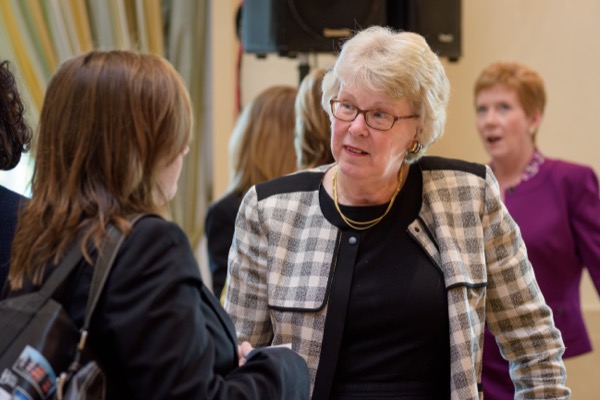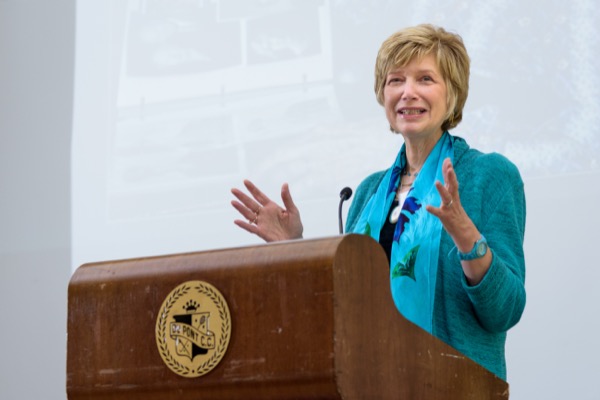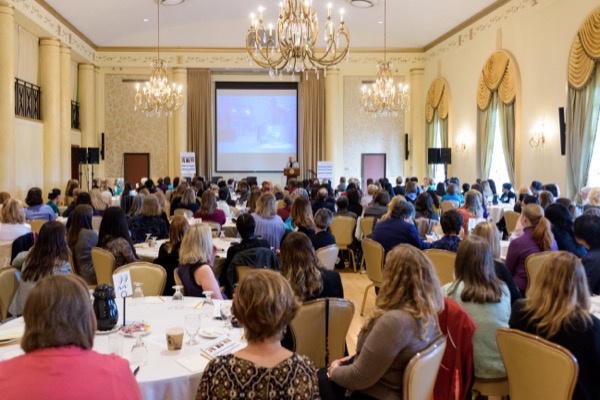


Inspiring Women in STEM
Hundreds gather to hone leadership skills, build networks
8:45 a.m., Oct. 20, 2015--If part of the goal was to inspire young women to pursue careers in science, technology, engineering and mathematics – the so-called STEM fields – that was clearly happening during the Inspiring Women in STEM Conference.
"I wrote it down here. 'Don't let other people define us,'" said Kadeija Griffin, a student at Delaware Technical Community College, after listening to University of Delaware Acting President Nancy Targett's keynote address. "That happens to me a lot. People pressure you, 'You can't do this, you can't do that.' And they stereotype community college kids. And I like something else she said: 'Go big or go home.'"
Campus Stories
From graduates, faculty
Doctoral hooding
Griffin intends to go big, in medicine.
If it was meant to give participants an opportunity to learn from women who are leaders in the STEM fields, well, that was happening, too.
Targett, a marine biologist and diver who has served since July 1 as acting president of UD, brought five "Lessons I Learned Underwater" to the conference, which was attended by more than 230 people.
A panel of expert communicators spoke on "Taking the Terror Out of Public Speaking." Two executives discussed how they manage family, work and other real-life issues. Several consultants offered strategies for building self-confidence and strong teams.
And UD alumna Alexandra Zafiroglu took her audience on a virtual trip around the world, something she routinely does in her work as an experience architect/anthropologist for the Intel Corporation, researching what kind of technology humans need and how real and potential advances could change their world.
The event, hosted by DuPont at the DuPont Country Club and presented by the Delaware BioScience Association, the Delaware Sustainable Chemistry Alliance and the Technology Forum of Delaware, was part mixer, part professional development, part booster shot.
Karen Maxson, a mechanical engineer for DuPont for 27 years, specializing in risk-based inspections, said it was her first such conference. Her new supervisor – a woman – urged her to attend.
"Until you go to one, you don't realize what it does," she said.
Among other things, Maxson said it opened her eyes to the challenges facing the millennial generation, information that came from Lauren Stiller Rikleen of the Rikleen Institute for Strategic Leadership. Rikleen sketched out distinctive traits and needs of baby boomers (born between 1946-64), Generation Xers (roughly from the mid-60's to the mid-80's), and millennials (from the mid-80's to about 2004) and distributed her book, You Raised Us – Now Work With Us to all attending.
Maxson checked with a few millennials at her table, who verified Rikleen's assessment of workers in their age group – that they are loyal to an individual more than they are to an institution, for example. They have matured in an era marked by domestic terrorism, school shootings and economic collapse.
"I'm recognizing that I need to adjust and understand what some others are going through," Maxson said. "It's very different than what I went through when I was entering the workforce."
Targett's "underwater" lessons drew on experiences she had while working in a Hydrolab habitat in 50 feet of water in St. Croix and in rough seas on a dive in Belize.
• Understand and embrace your strengths and weaknesses. Don't let peer pressure rob you of good judgment. Targett said she learned this while competing in a diving event that she thought was measuring speed and efficiency, but in fact was a test of good judgment – a test she passed after slowing her pace to ensure adequate breathing.
• Build a multi-generational network of friends and mentors for advice and support - and don't be afraid to ask your "dive buddies" for help.
• Remember the help you've received and pay those people back by offering your help to others.
• Challenge your stereotypes and recognize the power in diversity of thinking.
• Embrace life's challenges as opportunities to learn. You may not control the situation, but you can manage your response to it. She learned that when rough seas during a dive triggered potentially paralyzing fear – fear she conquered by making a plan, studying wave movement and calculating how she could avoid a dangerous reef crest and use the currents to find her way to safety.
Courtney Shatley, a Delaware Tech student with interest in biotechnology, said she will apply much of what Targett said when she visits Japan next week for a Ninjutsu martial arts event.
"I'm always so afraid that I'll go and succumb to peer pressure. I don't need to be ashamed to pace myself," she said. "Good judgment is a good characteristic – to pace yourself and know your weaknesses. That gave me peace of mind. I'm here for a STEM thing and it ends up as that!"
Public speaking strikes terror into many, regardless of gender, and three panelists offered many strategies for delivering strong and effective presentations – Melody Blanchford, a CPA and partner with Ernst and Young; Henri Moore, DuPont's global leader for philanthropy and education; and Debra Hess Norris, Unidel Henry Francis du Pont Chair in Fine Arts and the chair of UD’s Department of Art Conservation.
Among their recommendations:
• Prepare thoroughly
• Pause – for breath, clarity, emphasis
• Tell stories
• Take control of your bad habits
• Be your genuine self
• Don't bluff
• Recognize the privilege public speaking offers
• Enjoy your audience
Zafiroglu, the Intel researcher, described herself as an archaeologist turned cultural anthropologist.
She started by asking "How, and to what ends, do we add intelligence to our world?"
She then sketched out curious developments around the toilet, including a toilet paper holder that also serves as an iPad docking station, a Japanese toilet with an MP3 player to cover any sounds that might emerge, and a smart toilet that adjusts its position, water temperature and pressure with removable hand-held remote controls customizable for up to six users.
"What is ordinary? And what will be the new ordinary?" she said. "I see the world as an opportunity space."
She looks for unmet needs. During her talk, she discussed changes in "smart" homes, transportation, health care, energy, cities, industry and businesses and outlined ways women at Intel are shaping research and asking questions about how much data should be shared and where to draw boundary lines.
"How much do you want your house to report about you?" she said. "It's not just about the things, but the people in partnership and flow with the Internet of things."
Article by Beth Miller
Photos by Evan Krape










